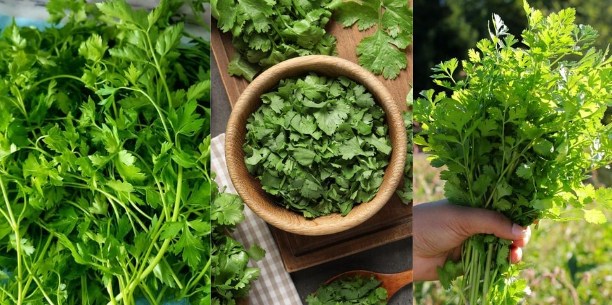Introduction:
Coriander, also known as coriander leaves, is a culinary herb cherished for its aromatic flavor in various global cuisines and valued for its impressive array of health benefits. This versatile herb is rich in essential vitamins and minerals and has been used in traditional medicine practices around the world to treat a variety of health issues. This article will delve into the health benefits of coriander, explore its nutritional content, and provide tips on how to incorporate it into your daily diet.
What is Coriander?
Coriander refers to the fresh leaves of the Coriandrum sativum plant, which belongs to the Apiaceae family. The term “coriander” is commonly used in many parts of the world to describe both the leaves and seeds of the plant, each part offering unique flavors and benefits.
Nutritional Profile of Coriander
Coriander is low in calories but packed with nutritional benefits. It includes:
- Vitamins: A rich source of vitamin A, C, and K.
- Minerals: Contains potassium, iron, and calcium.
- Antioxidants: Provides flavonoids and phenolic compounds that help fight free radicals in the body.
Health Benefits of Coriander
- Detoxification Properties: Coriander has been shown to bind to heavy metals like lead, mercury, and arsenic, helping remove them from the body. This makes it beneficial for detoxification programs.
- Antioxidant Effects: The antioxidants in coriander help reduce oxidative stress, which is linked to a variety of chronic diseases including heart disease, cancers, and neurodegenerative disorders.
- Anti-inflammatory Benefits: Coriander can help reduce inflammation in the body, which is beneficial for conditions such as arthritis and cardiovascular diseases.
- Digestive Health: Coriander is known for its digestive benefits, as it helps produce digestive enzymes that aid in the breakdown of foods.
- Antibacterial Properties: Some studies suggest that coriander oil has antibacterial properties that can effectively fight certain infections and foodborne pathogens.
Incorporating Coriander into Your Diet
- As a Garnish: Fresh coriander leaves are a popular garnish on dishes such as soups, tacos, and curries.
- In Smoothies: Blend a handful of coriander into your green smoothies for a nutrient boost.
- Herb Pesto: Use coriander as the main herb in a pesto sauce, which can be used with pasta or as a spread.
- Salads: Chop coriander and add it to salads for a burst of flavor.
Safety and Considerations
While coriander is generally safe for consumption, some individuals may experience an allergic reaction or sensitivity to the herb, which can cause gastrointestinal discomfort. Additionally, some people may find the flavor of coriander to be unpleasant, often describing it as soapy. This reaction is believed to be linked to a genetic trait.
Conclusion:
Coriander is more than just a flavorful addition to meals—it is a powerful herb with significant health-promoting properties. Whether used to detoxify the body, boost antioxidant intake, reduce inflammation, aid digestion, or combat bacteria, incorporating coriander into your diet can provide numerous health benefits, making it a valuable component of a balanced diet.

